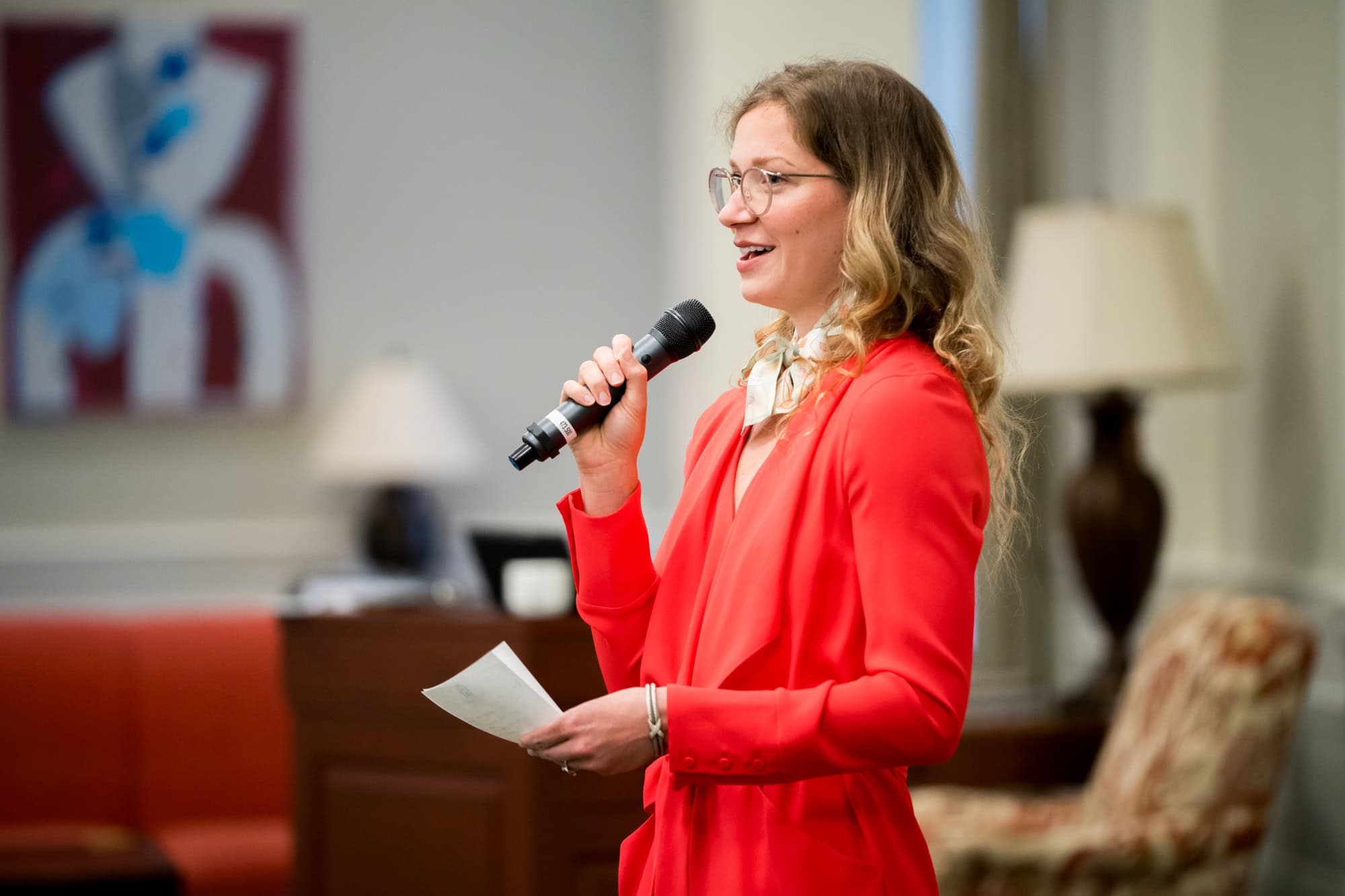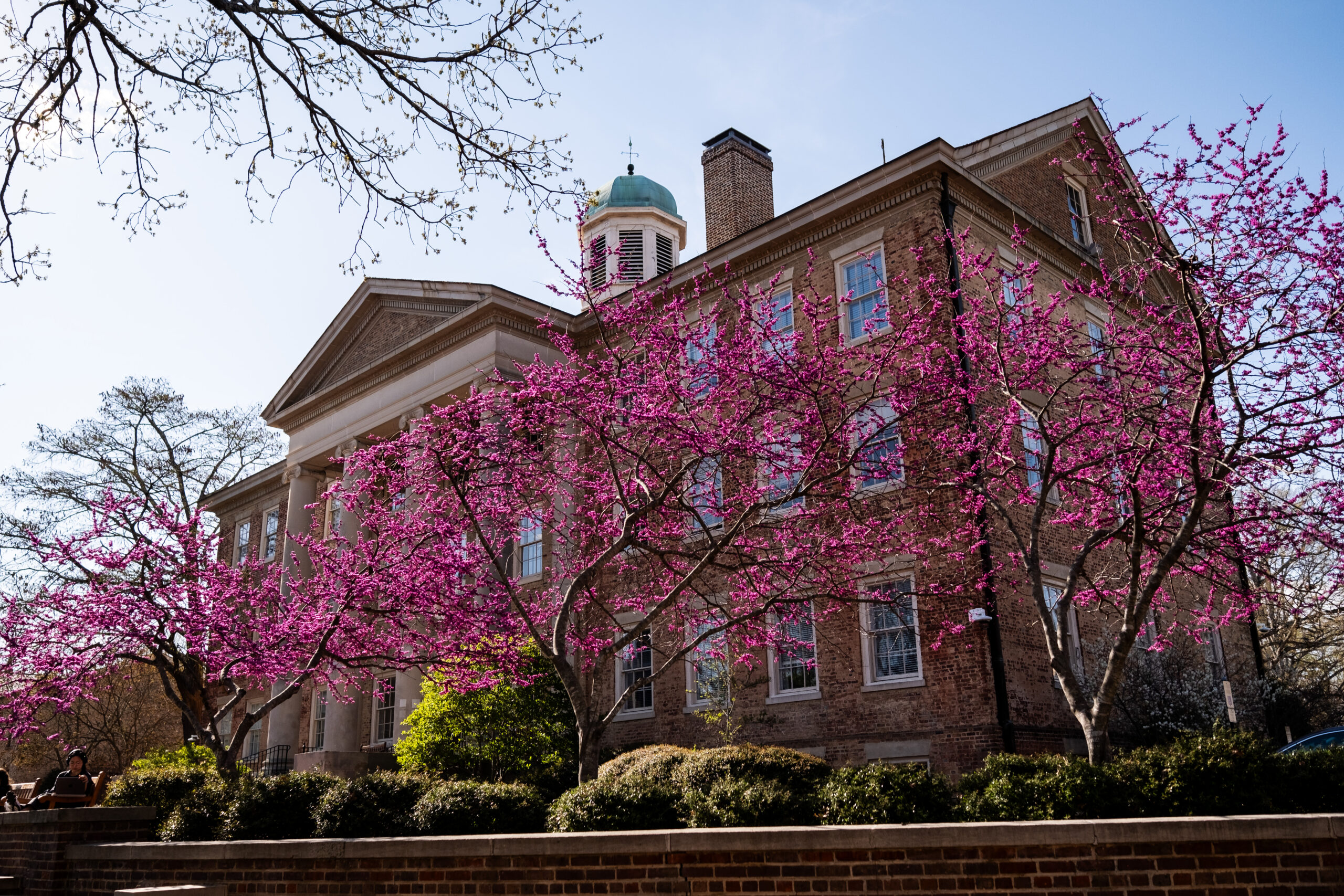
Dicle Kara ’16
Written by Laurelle Maubert ’25, Morehead-Cain Scholar Media Team Member
Dicle Kara ’16 followed a familiar playbook as a rising senior in college. Land a solid summer internship, get offered a full-time position from the same company, and start earning money immediately after graduation.
For her Professional Experience summer, she interned at Deutsche Bank at its office in Cary, North Carolina. The following year, she launched her career in product management at the financial services company, learning about the intersection of software and business.
Federal visa policies then began to change under a new administration. Dicle, originally from Antalya, Turkey, could no longer depend on a student visa. The kaleidoscope of opportunities that had welcomed her into the “real world” had been reduced to one: leave the United States.
“It was not my choice,” Dicle said.
Relocating to Berlin
Fortunately, working for an international company like Deutsche Bank afforded her the flexibility to relocate with relative ease. In 2018, she moved to the bank’s office in Berlin, Germany. After four more years at Deutsche Bank, Dicle joined Klarna, a Swedish fintech company, as a senior product analyst.
Dicle’s experiences and geographic proximity made her a favorable candidate at Henkel, a chemical and consumer goods company. The alumna is joining as a senior platform manager.
Even though the move had been unexpected, Dicle said she’s always wanted to live in Europe. As a Morehead-Cain Scholar, she spent a summer in Lusaka, Zambia, to work at the Chikumbuso Women and Orphans Project.
“Living abroad was a goal of mine, I just didn’t think it was going to be through something like that,” said Dicle, who majored in economics at Carolina.
Re-thinking politeness as culture
One of the biggest challenges of working abroad is learning to identify and adapt to cultural differences, she said.
Dicle noticed, for example, that Germans typically use a much more straightforward approach to feedback than Americans. In the United States, she was familiar with the “sandwich method,” when constructive comments related to performance are preceded and followed by positive comments.
“Unlike Americans, who provide a cushion and try to be very polite culturally, Germans are generally more direct,” she said.
What could be interpreted as rude for one culture can simply be a different communication approach for another.
“I’ve come to realize that my perception of ‘politeness’ was limited to what I saw in the United States and in Turkey,” she said.
Ditching ‘hustle culture’
Living in Germany has also changed Dicle’s mindset around work. When she was an international student attending college in the United States, she had fully embraced “hustle culture.”
“Because of the social security system difference [between the two countries], I feel that people who work in Berlin identify less with their jobs and careers than people I met in the United States.”
Dicle has found she worries less about healthcare, public transportation, and job security in Germany, a country that has a more robust social security infrastructure.
She works fewer hours than she did in North Carolina (where she recalls leaving work after 8:00 p.m on several occasions), in large part because Germany has stricter laws and regulations limiting working hours. It’s rare for her to receive an email past 6:00 p.m., and when she does, there’s no pressure to respond.
Dicle said she never truly believed in “work-life balance” before moving to Germany.
“I thought that work is life. We spend eight hours there, at least, so we think we have to enjoy it,” the alumna said. But after four years in Europe, she’s finally adopted the “Berliner approach,” where it’s possible to find fulfillment in what you do without being defined by it.
“What they do for a living and for their careers is not necessarily the most important thing about themselves,” she said. “At the end of the day, it’s still work, not life.”
Advice for scholars confronting culture shock: ‘Look inwards rather than outwards’
Dicle encourages Morehead-Cain Scholars to look beyond the United States when considering their post-graduate options.
“Working abroad can help you grow a lot and add value in both your professional and personal life,” she said. Taking advantage of the Summer Enrichment Program can help scholars prepare for handling different cultural contexts.
When entering a new culture, Dicle says it’s crucial to suspend judgment and “look inwards rather than outwards” to confront your own biases.
“Instead of trying to change or judge what I experienced, I realized that the right attitude is asking, ‘What can I do differently to adapt?’”
In this series, Laurelle Maubert ’25 interviews Morehead-Cain Alumni who are working abroad. Her previous piece featuring Chelsea Phipps ’13 explores how the alumna found her passion for international development. Chelsea is the EU policy consultant for the Bill & Melinda Gates Foundation in London. The alumna was nominated to the Morehead-Cain by Smoky Mountain High School in Jackson County, North Carolina.
About the Morehead-Cain Scholar Media Team
The Morehead-Cain Scholar Media Team is an extracurricular program and internship run by the Foundation’s communications team. Scholars of all backgrounds and class years collaborate to produce multimedia content on the topics and issues they’re passionate about, as well as support Morehead-Cain’s institutional communications.
Members cover the following beats, tied to Morehead-Cain’s departments: selections and recruitment, the scholar experience, development, and alumni engagement. Scholar-generated content is distributed across all of Morehead-Cain’s channels, including social media (Facebook, LinkedIn, Twitter, Instagram, and YouTube), the Catalyze podcast, email newsletters, and the website (www.moreheadcain.org). The team’s audience comprises more than 3,300 scholars and alumni and their constituents.
Current members of the team for fall 2022 include William Dahl ’25, Laurelle Maubert ’25, Cate Miller ’25, Ria Patel ’25, Tucker Stillman ’25, Flavia Nunez Ludeiro ’26, and Elias Guedira ’26. The team is led by Sarah O’Carroll, Content Manager of the Morehead-Cain Foundation.
If you’re interested in learning more about the Scholar Media Team, contact the communications team. Participation is a semester-long commitment.


